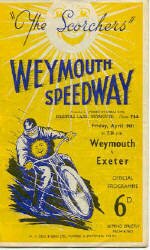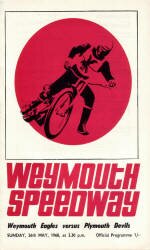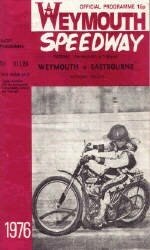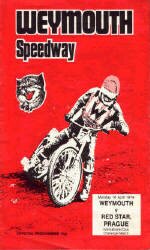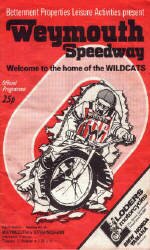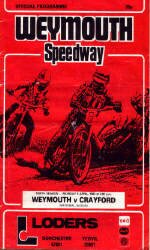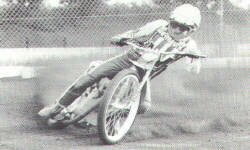|
|

|
| intheteam | |
Find Club | |
Help | Wessex Warriors |
History of Weymouth SpeedwayCompiled by Ray Collins 1954-1962 Speedway at the Wessex Stadium started in 1954 under the promotion of JW Coates, R Barzilay and WJ (Bill) Dutton. Guest of honour at the opening ceremony on 4 August 1954 was World Champion Freddie Williams and this was followed by a Young England v Young Overseas match. The "Weymouth Scorchers" made their debut the following week with a win against Southampton and there then followed a series of six more challenge matches mainly against National League Division 2 teams. The Scorchers used mainly guest riders for these matches, most appearances being by Gerald Pugh (6 matches), Chum Taylor, Jack Cunningham and Jack Mountford (5 each) and Bert Clarke and Neil Street (4 each). In 1955 Weymouth entered National League Division 2 and made an excellent start with a 52-44 home win over Exeter. Unfortunately that was to be the high point of the season and a combination of poor results, bad weather and consequent disappointing crowds led to the closure of the track the sixth home meeting which saw them lose 39-57 to Rayleigh in a Division 2 match. The Scorchers team of that year was captained by Ken Adams Top scorer was Australian Ernie Brecknell with 49 from 5 League matches, although Ron Barrett who joined a couple of weeks into the season was the most successful rider with 32 points from 3 League matches. Speedway was revived at the Wessex Stadium in 1962 by BBC television cameraman John Pilblad who had previously promoted at Aldershot. A season of 8 meetings was staged with the Wessex Championships, a Pairs meeting and challenge matches against a variety of opposition. The team was known as the "Weymouth Royals". Star of the season was undoubtedly Buster Brown who at one time had ridden for Wembley Lions in the National League Division 1. Other team members included Lew Coffin, Alby Smith and Frank Bettis with future Newport rider and Weymouth Manager Bob Hughes making his debut in mid season. 1963-1964 In 1963 the Wessex Stadium saw a total of 14 meetings, most of which were team matches with the Royals meeting Rye House, Eastbourne, a number of Provincial League "B" teams and some "Select" teams. Lew Coffin took over as captain of the Royals and he was supported by Ken Vale, Frank Bettis, Pat Flanagan and Ray Wickett. Youngsters Bob Hughes, John McGill and John Hammond were also given opportunities to gain experience. In 1964 the Provincial League operated outside of Speedway Control Board authority following a major dispute over how Speedway should be run. A number of non-league tracks decided to operate alongside the Provincial League, including Weymouth and these teams decided to form a new league called the Metropolitan League along with a couple of Provincial League "B" teams. The full make up of the Metropolitan League was: Eastbourne, Exeter "B", Ipswich, Newpool (a combined Newport and Poole "B" team), Rayleigh and Weymouth. Unfortunately the League was not completed and after a 6 meeting season John Pilblad ceased to be promoter of Weymouth Speedway. Leading riders for Weymouth in the season were Ken Vale, Bob Hughes, John Poyser and John Mills with John McGill giving consistent support. In the Autumn of 1964 George Bargery organised Training Schools at the track and these were to run consistently during the next few years.
1965-1967 George Bargery promoted one official meeting in 1965, this being the Wessex Championship on 13 April. It was won by Pete Swain with a 15 point maximum with John McGill and Norman Brown joint second on 13. Lew Coffin took over the running of the Training School in the Autumn of 1965 but there was to be no return of "official" Speedway until 1968.
1968-1973 When the British League decided to form a second division in 1968, Wally Mawdsley and Pete Lansdale decided to enter a team from Weymouth which was to be known as "Weymouth Eagles". Howdy Byford was their Manager at Weymouth. After away matches at Rayleigh and Plymouth, the Eagles started their home season on 2 June with a 42-36 win over Plymouth. Tony Lomas and Mike Vernam were consistent high scorers with Chris Yeatman, Mick Steel and Roy Carter backing them. Lomas was particularly good around the Wessex Stadium track, notching maximums in 6 of his 9 home matches and dropping only 1 point in another. Sensation of the season though was Barry Duke. He was given a chance in the second half one week, replaced a late arriving reserve in the Weymouth team against Crayford the following week (16 June), was promoted to second string as partner to Mike Vernam against Reading on 23 June and was scoring a maximum against Nelson the next week from the heat-leading number 3 position. With his long flowing hair and hippy looks he became Weymouth Speedway's first real folk hero. The Eagles finished ninth out of 10 in the 1968 Division 2. In the Division 2 Riders Championship at Hackney, Tony Lomas scored 7 points. Promoters Mawdsley and Lansdale took the rather strange decision to end the home season with the match against Berwick on 4 August just as crowds were (as always at Weymouth) starting to increase significantly. During the winter they decided to move the team to Rochester and then on to Romford where they stayed some 2-3 seasons. The training schools started again in the Autumn as usual. Although there was no League Speedway at Weymouth from 1968 until 1974, Lew Coffin continued to develop the very successful and well respected training school which produced a string of riders who made their way into various League teams. Laurie Etheridge, Bob Coles, Bernie Leigh, John Davis, Mike Sampson, Pete Wigley, Geoff Swindells, Brian Woodward, Clark Facey, Neil Middleditch, Roger Stratton and Martin Yeates were among those to come through Lew Coffin's school during these years. An anual Training School Championship was staged as well as home and away training school matches against the likes of Eastbourne and Wolverhampton. 1974 Harry Davis had bought the Wessex Stadium in the early 1970's and in 1974 he teamed up with Boston promoters Cyril Crane, Gordon Parkins and Ted Holding to enter the Weymouth Wizards in British League Division 2. Bob Hughes was signed up to bring some experience to a team which otherwise had less than 20 league appearances between them. Clark Facey and Kelvin Mullarkey had each ridden a few matches for Hull in 1973 and they were the other two heat leaders at the start of the season. Nevertheless it proved to be an entertaining team although inexperience too often proved to the downfall in some of the closer matches. A late season 38-39 loss at home to fellow strugglers Sunderland in a match where anything that could go wrong did go wrong proved to be crucial and the Wizards finished bottom of the 19 team league, two points adrift of both Sunderland and Scunthorpe. The final league record from 36 matches was: won 10, drew 0, lost 26. The Sinalco Cola Trophy (forerunner of the Seyco Trophy) was won by Boston's Carl Glover with a 15 point maximum. Weymouth's Nigel Couzens won a run-off for 2nd place from his team mate Kelvin Mullarkey and Trevor Geer of Eastbourne after all 3 had totalled 12 points. In the Division 2 Cup the Wizards were beaten 83-72 on aggregate by Boston. 1975 The 1975 season promised much with new heat leaders Martin Yeates and Brian Woodward providing a very good spearhead and reserve pairing Vic Harding and Tony Freegard looking full of points in the early season. Some of the early season away matches saw really excellent Weymouth performances but somehow the team seemed to just not have the usual home track advantage. Confidence waned, inconsistency at home continued and the away performances slipped away from the promise of the early season. Injuries did not help and when Brian Woodward was injured towards the end of the season there were some very heavy away defeats. The Wizards finished in last place out of 20 teams in the League which had been renamed from British League Division 2 in 1974 to National League in 1975. From their 38 League matches they won 8, drew 2 and lost 28 to finish 5 points adrift of Mildenhall. Despite the disappointing League campaign the team performed very well in the League Cup, beating Peterborough 79-77 and Bradford 81-75 to reach the Semi-final. Eastbourne beat them 96-60 on aggregate but they did at least beat their south coast rivals for the first time in the home match. The Seyco Trophy was won by Vic Harding with a 15 point maximum from Brian Woodward on 14. A run-off for 3rd place was won by Paul Gachet from his fellow Eastbourne rider Mike Sampson after both finished on 12. 1976 After his rapid progress in 1975 Vic Harding was made captain of the team in 1976 and consistently continued to improve throughout the season. Vic and Martin Yeates were the clear stars of a side which again was somewhat inexperienced. A major event in mid season was the signing of Danny Kennedy a young Australian who despite a tentative start in his first away matches made such rapid progress that by seasons end Weymouth had a trio of genuine heat leaders who were well backed by Chris Robins and Gerald Purkiss. Despite the improvement in strength, inconsistency at home was again a problem with the Wizards losing 6 of their 17 home matches. Three of these defeats came in a 4 match run in late season but a lot of Wizards fans would have gained satisfaction from the fact that the one win in that run was a 49-29 demolition of the old enemy from Eastbourne. Overall there was clear progress from the previous two seasons and the Wizards finished in their National League campaign in fourteenth place out of 17. Their League record from 34 matches was won 11, drew 2, lost 21. Martin Yeates rode in the National League Riders Championship at Wimbledon scoring 3 points. Les Collins of Stoke won the Seyco Trophy with a 15 point maximum and Oxford's Kevin Young was second with 12. The run-off for third place between Danny Kennedy, Chris Robins and Oxford's Phil Bass resulted in a spill involving all three riders with Kennedy being excluded, Robins unable to take part in the re-run and Bass being awarded the race and overall third place. In the League Cup Weymouth lost 86-70 to Oxford. 1977 1977 was a season of upheaval at the Wessex Stadium. Martin Yeates moved on to Oxford before the start of the season and Malcolm Corradine was brought in to provide a heat leader trio along with Danny Kennedy and Vic Harding. Chris Robins and Geoff Swindells gave very good second string strength and there was the expected debut of Sean Willmott who had long been a training school rider of high potential and would reach the minimum racing age of 16 in May. Early season results mirrored those of the previous two seasons with some good away performances bringing close results but no wins coupled with lapses at home. Chris Robins moved to Leicester early in the season but the real body blow came in the middle of the season when inspirational skipper Vic Harding moved to Hackney. Stability was not really restored until the late season arrivals of Rob Jones and Chris Julians. In particular Julians' experienced approach had an influence far in excess of his points tally. In the National League Riders Championship at Wimbledon, Danny Kennedy scored 4 points. Boston again proved to be Weymouth's conquerors in the League Cup with the Wizards going down 86-69 on aggregate. There was a home track winner in the Seyco Trophy when Malcolm Corradine scored a 15 point maximum. Again there was a run-off, this time for 2nd place and Eastbourne's Mike Sampson beat Danny Kennedy after both had scored 13 points. 1978 1978 saw a number of changes with Len Silver taking over as promoter. A promoter of vast experience at Hackney and Rye House, Len was determined to give Weymouth Speedway a new start. A new name (Wildcats) and new colours (red and white replacing the unique but somewhat dull purple and white) were the immediate and obvious changes but there was also a whole new air of optimism about the place. The starting gate was moved to the more popular opposite side of the track where the covered accommodation was and by mid season there was also seating on that side. The team was not vastly changed from 1977 but the experienced and professional Malcolm Shakespeare was added together with Canadian Gary Ford who was a very effective reserve throughout the season. Finishing 13 out of 20 in the League marked distinct progress from previous seasons and there was also success in beating Mildenhall, Milton Keynes and Oxford to win their National League Fours group and progress to the Semi-finals for the first time. Weymouth's first win in any National League competition followed when Danny Kennedy saw off all the League's top riders to win the Warners Grand National individual title at Hackney. In the National League Riders Championship Danny Kennedy scored 8 points. In the League Cup Weymouth were beaten 89-64 by Canterbury. The Seyco Trophy was won by Malcolm Shakespeare in a run off against Canterbury's Steve Koppe after both finished on 14 points. Danny Kennedy finished 3rd with 13. The League record for the 38 match season was:won 16, drew 0, lost 22 for 32 points. 1979 Len Silver withdrew from the promotion of Weymouth Speedway during the winter of 1978/79 following a disagreement over terms for using the stadium and Allied Presentations (the promotion at Reading) stepped in to take over the licence. The 1978 team had already been dispersed with only Geoff Swindells remaining but the new promoters quickly put together an impressive looking squad for the 1979season. Bob Coles was brought in to captain the side, Brian Woodward came back to Weymouth and Doug Underwood was expected to be an outstanding National League rider following a good career in the British League. The new management also predicted great things for Barry Allaway and Kevin Bowen. Despite the emergence of young Australian Terry Tulloch and the return of Malcolm Shakespeare in mid season, the team never really clicked and drifted back down to the league to finish 18 out of 19. Overall it was probably the most dismal season since the return of Speedway in 1974, particularly after the promise of 1978. The League record from 18 matches was 9 wins, 1 draw and 26 losses. The team fared no better in the National League Cup, losing 100-56. For the first time no run-off was needed to settle places in the Seyco Trophy with George Hunter of Oxford winning it on 14 points from Mildenhall's Melvyn Taylor (13) and Ashley Pullen of Rye House (12). In the National League Riders Championship at Wimbledon Brian Woodward scored 1point. 1980 Early in 1980 Allied Presentations announced that they would no longer promote Speedway in Weymouth and with the season fast approaching it seemed that there would be no team at all at Weymouth. However Phil Lock who had followed the sports since its introduction to Weymouth in 1954 was determined that it would not die and he interested local businessman Mervyn Stewkesbury in becoming the newpromoter. With little time for team building the duo nevertheless did a good job in attracting several riders to form a strong looking team. Bob Coles, Brian Woodward and Terry Tulloch remained from 1979 and both Martin Yeates and Malcolm Corradine returned to Weymouth. Great things were expected of former England international and Belle Vue heat leader Chris Pusey. Geoff Swindells also returned for a brief spell in mid season but the high point of the season was the emergence via the second halves of Simon Wigg. Considering the haste with which the team had been put together and the disappointing form of a couple of the more experienced of them, finishing 17th out of 20 should have been considered OK but it was a measure of the new promotion that they were very disappointed. Still, the basis was now there for improvement. The team's league record from its 37 matches was: won 13, drew 1, lost 23. The away match at Crayford was not ridden after a number of postponements at the end of the season. Again Weymouth were beaten in the first round of the League Cup but this time it was a close 78-77 loss to Oxford. The Seyco Trophy was won by John Hack of Oxford who beat Mildenhall's Robert Henry in a run-off after they had finished on 13 points. Weymouth's Martin Yeates was third with 12. Martin Yeates was runner up in the National League Riders Championship at Wimbledon when he beat Ellesmere Port's Steve Finch in a run-off. Wayne Brown of Berwick won the title. 1981 1981 turned out to be the most successful season so far at the Wessex Stadium. The Wildcats finished runners- up in the League and became a force to be reckoned with wherever they went. Additionally Martin Yeates won the Silver Helmet and Simon Wigg finished runner-up in the National League Riders Championship. Steve Schofield established himself in the team and along with Malcolm Shakespeare, Bob Coles and Terry Tulloch gave very solid backing to the heat- leader trio of Yeates, Wigg and Brian Woodward. The addition of Les Rumsey to the team in mid season completed what must rank as the strongest team Weymouth ever had. Weymouth League record from 36 matches was: won 26, drew 1, lost 9. They finished 8 points behind Champions Middlesbrough. In the League Cup there was a first round 133-57 victory over Workington was followed by defeat 99-93 at the hands of Berwick. Simon Wigg scored 13 points in the National League Riders Championship, 2 points behind Mike Ferreira of Canterbury and 2 in front of third place man Bruce Cribb of Wolverhampton. 1982 Brian Woodward, Bob Coles and Malcolm Shakespeare all left the Wildcats during the 1981/82 winter but there was a new Australian - the colourful Stan Bear for whom 1982 was a debut season in the UK. John McNeill also joined the team in June. Another successful season followed with the team finishing 5thin the League and reaching the Semi-finals of the League Cup for the first time since 1975. Simon Wigg became a National League super star, becoming the first rider from the League to reach the British Final of the World Championship. He was also the first National League rider to reach a World Final when he qualified for the 1982 World Long Track Championship Final. Another first was on 27th June when a Weymouth team rode overseas. This was a Four Team Tournament in Bolderberg, Belguim. Weymouth finished 2nd of the 4 and were represented by Steve Crockett, Mark Minett, Stan Bear and Rob Mather. The National League Pairs Championship at Swindon was dominated by Weymouth. Simon Wigg and Martin Yeates scored 5-1's against Boston, Crayford and Glasgow to easily win their group before beating Middlesbrough 5-1 in the Semi-final and Long Eaton by the same score in the Final. It was the first time in the Championship that a pair had both gone through the meeting completely unbeaten by an opponent, a feat which has never been repeated. Weymouth's League record from 36 matches was: won 22, drew 1, lost 13 for 45 points. In the League Cup Canterbury were beaten 102-90, Exeter 98-94 and Peterborough 101-91 before the Wildcats lost 124-67 to Newcastle in the Semi-final. Because of a clash of dates with the World Long Track Final, Simon Wigg could not take his place in the National League Riders Championship at Wimbledon and was replaced by Martin Yeates who scored 5 points. 1983 The 1983 season saw some of the more experienced riders leave with only Martin Yeates, Steve Schofield, Stan Bear and Rob Mather remaining from 1982. Cradley Heath youngster Simon Cross was brought in on loan and the squad was made by newcomers David Biles, Chris Martin and brothers Gordon and Ian Humphreys. Some doubts were expressed about the strength of the team before the start of the season but with Steve Schofield developing into heat leader class the young team surprised many and was far more successful than some of the "strong on paper" teams of the past. A 4th place finish in the 18 team league and a first ever appearance in the League Cup Final achieved with a young and relatively inexperienced team made for some excellent racing week after week. From their 34 League matches, Weymouth won 19, drew 2 and lost 13 for 40 points. In the League Cup Weymouth beat Boston 109-93, Glasgow 119-87 and Newcastle 97-95 before losing 96-95 in an exciting Final against local rivals Exeter. Weymouth scorers in the two leg Final were: Martin Yeates 25, Steve Schofield 25, Simon Cross 20, Stan Bear 15, Gordon Humphreys 4, Chris Martin 3, David Biles 3. In the National League Riders Championship Martin Yeates scored 12 to finish 3rd overall behind Steve McDermott (Berwick) and Richard Knight (Mildenhall). Weymouth retained the National League Pairs Championship, this time at Belle Vue where Martin Yeates and Simon Cross beat Glasgow 4-2 in the Final. 14 points at the group stages saw Weymouth comfortably qualify over Crayford, Rye House and Edinburgh and although Simon Cross fell in the Semi-final, Martin Yeates race win was enough to beat Newcastle. 1984 Highlight of the 1984 season was the exploits of Martin Yeates in the World Championship. A much changed team featured new riders Alun Rossiter, John Barker and Colin Ackroyd but it was not until Martin Yeates returned to the team at the end of May that Weymouth started to show consistent form. In only his second year David Biles developed into a good quality heat leader and with Yeates quickly slotting back into his high scoring role they combined with Rossiter to form a strong heat leader trio. Three 38-40 losses at home meant an eventual place of 13th in the 16 team league with a record from 30 matches of: won 13, drew 0, lost 17 for 26 points. In the League Cup Weymouth lost 83-73 to Canterbury. Martin Yeates scored 10 points in the British Final of the World Championship to finish 4th and become the first National League rider ever to progress beyond that stage. In the National League Pairs Championship Martin Yeates, this time partnered by David Biles, was again unbeaten and came close to winning the title for the 3rd successive season. The Weymouth pair beat Hackney, Canterbury and Arena Essex in the rounds but a David Biles fall in the semi-final when the youngster was splitting the experienced Berwick pairing meant elimination. Martin Yeates scored 12 points in the National League Riders Championship and then beat Scunthorpe's Andy Buck in a run-off for 3rd place. Top 10 Points Scorers Martin Yeates 2435 Brian Woodward 1084 Simon Wigg 963 Danny Kennedy 830.5 Steve Schofield 825 Vic Harding 650 Martin Yeates (ALL TIME GREAT) Geoff Swindells 629 Malcolm Shakespeare 614 Malcolm Corradine 534 Bob Coles 484 Top 10 Averages Martin Yeates 10.73 1984 Simon Wigg 10.67 1982 Martin Yeates 10.41 1983 Les Rumsey 10.23 1981 Simon Wigg 10.23 1981 Martin Yeates 9.83 1981 Tony Lomas 9.39 1968 Danny Kennedy 9.23 1978 Martin Yeates 9.23 1980 Alun Rossiter 9.19 1984 Top 20 Appearances Martin Yeates 198 Brian Woodward 138 Geoff Swindells 121 Terry Tulloch 100 Steve Schofield 96 Danny Kennedy 91 Malcolm Shakespeare 89 Simon Wigg 89 Vic Harding 84 Bob Coles 73 Malcolm Corradine 71 Nigel Couzens 70 Chris Robins 66 Stan Bear 63 Roger Stratton 59 Sean Willmott 59 Garry May 57 Mark Dekok 46 David Biles 46 Les Rumsey 43 |
||||||
|
|
|
|||||
